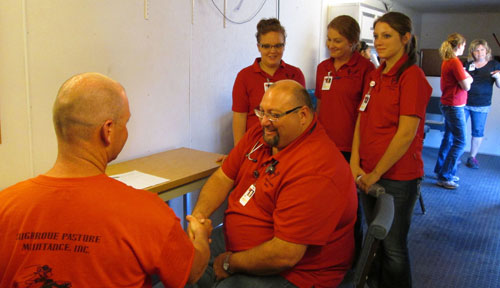When the faculty and students show up in UNMC polo shirts, jeans and boots, you know it’s another farm safety clinical day.
For the past month, faculty and students at the Kearney Division of the College of Nursing have participated in a new safety project sponsored by the Nebraska Safety Center at the University of Nebraska at Kearney. The goal of the project is to reduce farm injuries and death through health and safety awareness.
For the Kearney nursing students, it was a chance to practice their assessment skills and learn about safety issues.
Cindy Ference, an instructor in Kearney who is helping with the project, said, “It’s a nice lens to look at the rural population. We look at their risks and how that translates to their health status. It helps the students make the connection.”
The program began last year when the college was recommended to the Safety Center as a possible partner in the program. The project is funded by a $15,000 grant from the Central States Center for Agriculture Safety and Health at UNMC.
So far, three Kearney-area farms have been involved in the on-site farm safety and health screenings.
Michelle Ellermeier, another Kearney instructor, and Kermit Bosshammer, transportation-ag training instuctor for the Nebraska Safety Center, both took a three-day class to become certified to inspect farms for safety.
“When we go to the farms,” Ellermeier said, “we inspect the tractors and grain and animal handling equipment. We check the traffic flow, electrical, machine shop and building hazards. We then talk to them about possible dangers. It’s a time of teaching.”
She said the students are involved with the inspection. “It can translate to any environment,” she said. “We use the farm as a way to teach environmental safety.”
The second part of the program is the health screening for the farmer and any of his employees.
“For a beginning nurse, it’s a great learning tool to go into an area and work where they know there is a high risk of trauma,” instructor Steph Burge said. “When they can identify things in an agricultural setting that impact health and how people become injured, that serves them very well later on in their careers.”
Ellermeier said when the inspection and assessment are completed, and before they leave the farm, the farmer receives a report on what was found.
